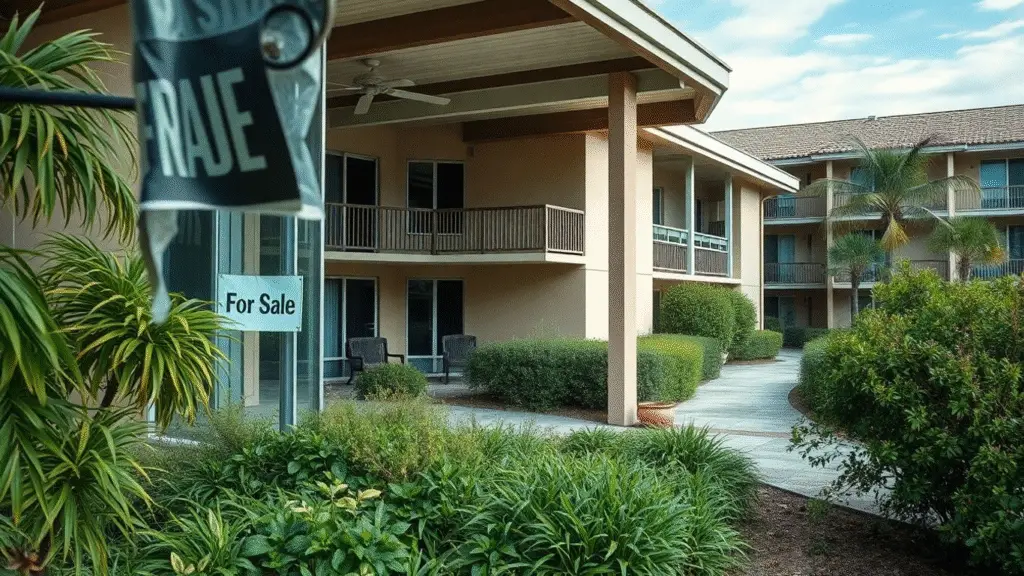The Allure Versus The Reality of Timeshare Purchases
Many people are drawn to timeshares by the promise of guaranteed vacations and a sense of ownership. The idea of having a set place to go each year, often in desirable locations, sounds appealing. Developers paint a picture of luxury and ease, making it seem like a smart investment for future holidays. However, the reality often falls short of these initial promises.
What starts as an exciting purchase can quickly turn into a financial burden. The initial cost is just the beginning; ongoing maintenance fees, special assessments, and potential exchange fees can add up significantly. Many owners find themselves locked into a commitment that becomes difficult to manage, especially when life circumstances change.
The dream of endless vacations can quickly become a costly obligation. It’s important to look beyond the glossy brochures and understand the long-term financial implications before signing any agreement. The allure of a timeshare can mask a significant financial commitment that many overlook.
Deceptive Sales Tactics and Lack of Transparency
Timeshare sales presentations are notorious for high-pressure tactics. Salespeople often use misleading information, create a false sense of urgency, and downplay the long-term costs. They might promise benefits that aren’t clearly defined in the contract or fail to disclose crucial details about fee increases and transfer restrictions. This lack of transparency is a major issue.
Many states still lack robust laws requiring full disclosure from timeshare developers. Unlike other long-term financial commitments, such as mortgages or car loans, timeshare agreements may not be subject to the same stringent consumer protection regulations. This leaves buyers vulnerable to hidden costs and unexpected obligations.
Consumers are often rushed into signing contracts without fully understanding the terms. The emphasis is on closing the deal, not on ensuring the buyer comprehends the lifetime financial commitment they are undertaking. This environment makes it easy for deceptive practices to thrive, leaving owners with buyer’s remorse and financial strain.
The Lifetime Financial Commitment
When you buy a timeshare, you’re not just buying a vacation for one year; you’re often entering into a contract that lasts for decades, sometimes in perpetuity. This means you are committed to paying annual maintenance fees, property taxes, and potentially other assessments for the entire duration of the contract. These costs can increase over time, often without much notice.
It’s crucial to recognize that a timeshare is not typically an investment that will appreciate in value. Instead, think of it as a prepaid vacation expense that comes with ongoing obligations. The financial commitment is a significant factor that many potential buyers fail to grasp fully during the sales process.
Understanding this lifetime financial commitment is key to avoiding future problems. The risk of foreclosure is directly tied to the inability to meet these ongoing financial obligations, a reality that many timeshare owners discover too late.
Timeshare Foreclosure Explained
When Payments Become Unmanageable
Timeshares often come with ongoing costs beyond the initial purchase price. These include annual maintenance fees, special assessments, and sometimes even property taxes. For many owners, these recurring expenses can become a significant financial burden, especially if their income decreases or unexpected life events occur. When making these payments becomes a struggle, the risk of falling behind is very real.
This can ultimately result in timeshare foreclosure explained in detail by Wesley Financial Group, where missed payments may trigger legal and financial consequences for owners. This can quickly lead to a situation where the timeshare debt grows, making it even harder to catch up.
It’s not uncommon for timeshare contracts to lock owners into these payments for life, or for many decades. The lack of flexibility in these agreements means that even if an owner can no longer use or afford the timeshare, they are still obligated to pay. This financial commitment can feel overwhelming when circumstances change, pushing owners towards default.
The Threat of Collections and Foreclosure Actions
When timeshare payments are missed, the resort or management company typically has a process for dealing with delinquent accounts. This often starts with reminder notices and phone calls. If the debt remains unpaid, the account may be turned over to a collection agency. These agencies can be persistent in their efforts to recover the money owed.
Ultimately, if payments are not made, the timeshare company can initiate a foreclosure action. This process varies by state and by the specific type of timeshare ownership. It can involve legal proceedings to repossess the property and recover the outstanding debt. The threat of foreclosure is a serious consequence that many owners do not fully consider when they first purchase a timeshare.
Consequences of Foreclosure on Your Credit
A timeshare foreclosure can have a significant negative impact on your credit report and score. When a foreclosure is reported, it stays on your credit history for several years, typically seven. This mark can make it much harder to obtain future loans, such as mortgages or car loans, as lenders view it as a sign of significant financial distress.
- Credit Score Drop: Expect a substantial decrease in your credit score, potentially around 100 points or more.
- Difficulty with Future Borrowing: Lenders may be hesitant to approve new credit applications.
- Impact on Renting/Employment: Landlords and employers often check credit reports, and a foreclosure can be viewed negatively.
The long-term effects of a timeshare foreclosure can extend far beyond the loss of the property itself, affecting your ability to manage your finances for years to come.
This damage to your credit can take a long time to repair, often seven to ten years, making it a consequence that weighs heavily on an owner’s financial future.
The Impact of Foreclosure on Your Financial Future
Damage to Credit Scores and Future Borrowing
When a timeshare goes into foreclosure, it’s a serious mark on your financial record. This event can significantly drop your credit score, often by around 100 points or more. This isn’t a small blip; it’s a major red flag for lenders.
Think of it this way: a foreclosure shows a clear failure to meet a financial obligation. This makes it much harder to get approved for loans, mortgages, or even new credit cards down the line. Lenders see this as a high risk, and that perception can stick with you for years.
Difficulty Securing Housing and Employment
Beyond just loans, a damaged credit score can affect other parts of your life. Landlords often check credit reports before approving rental applications. A foreclosure on your history might make them hesitant to rent to you, seeing it as a sign of irresponsibility.
Similarly, some employers review credit reports as part of their hiring process, especially for positions involving financial trust. A foreclosure could make it harder to land certain jobs, as it might raise concerns about your reliability.
Potential for Deficiency Judgments
Here’s a particularly worrying aspect of timeshare foreclosure: the possibility of a deficiency judgment. If the timeshare resort sells your foreclosed property for less than what you owed, they might be able to sue you for the difference.
For example, if you owed $15,000 and they only managed to sell it for $10,000, you could be on the hook for that $5,000 gap. This means the financial hit from the timeshare doesn’t end with the foreclosure itself; it can continue to haunt your finances.
The long-term financial consequences of a timeshare foreclosure can be severe and far-reaching, impacting your ability to manage money for years to come.
Navigating Timeshare Contracts and Fees
Hidden Costs and Unexpected Fee Increases
The price tag on a timeshare is rarely the final cost. Buyers often face a barrage of additional charges that can significantly inflate the initial investment. These can include closing costs, administrative fees, and processing charges, which are sometimes revealed late in the sales process. It’s important to get a full breakdown of all costs in writing before signing.
Annual maintenance fees are a common expense, often starting around $800 and climbing much higher for premium properties. Beyond these regular charges, special assessments can be levied for unexpected resort repairs or upgrades. These fees can appear without much warning, adding a substantial financial burden.
Always demand a clear, written explanation of every fee associated with the timeshare. Relying on verbal assurances during sales pitches is a risky strategy. Understanding these various fees is key to avoiding financial surprises later on.
Complex Transfer Procedures and Their Pitfalls
Transferring timeshare ownership can be a complicated process, often involving significant fees. These transfer fees are sometimes hidden within the contract’s fine print. The lack of industry standardization means procedures and costs can vary wildly from one resort to another.
Attempting to sell or give away a timeshare can also trigger these transfer fees. If the process isn’t handled correctly, owners might find themselves still liable for ongoing maintenance fees. This is a common pitfall that many owners overlook.
It’s wise to research the specific transfer requirements and associated costs for your timeshare well in advance. This proactive approach can help prevent unexpected expenses and complications.
The Role of Exchange Program Fees
Many timeshare owners utilize exchange programs to swap their week for a different location or time. While these programs offer flexibility, they come with their own set of fees. Booking fees, reservation fees, and annual membership dues are common.
These exchange program fees add another layer to the overall cost of timeshare ownership. Owners need to factor these into their budget, especially if they plan to use the exchange system frequently. The value proposition of the exchange program must be weighed against its associated costs.
Understanding the fee structure for any exchange program is vital. It helps owners make informed decisions about how to best utilize their timeshare and manage expenses effectively.
The Challenge of Reselling and Exiting Timeshares

Oversaturated Resale Markets
Trying to sell a timeshare can feel like shouting into the void. The market is flooded with people looking to offload their ownership. This means there are far more sellers than buyers. Prices often plummet, with many timeshares selling for a fraction of their original cost. It’s a tough reality for owners who thought their timeshare would hold its value.
The Rise of Resale Scams
When owners can’t sell through traditional means, they often turn to third parties. This is where resale scams become a serious problem. Unscrupulous individuals prey on desperate owners, promising a quick sale for an upfront fee. Once the money is paid, the scammer disappears, leaving the owner with no sale and less money. It’s a disheartening experience that adds to the difficulty of exiting a timeshare.
Exit Company Fees and Promises
Many companies claim to offer a guaranteed way out of timeshare contracts. While some might be legitimate, the industry is full of those who overpromise and underdeliver. Owners can end up paying thousands of dollars in fees to these companies, only to find themselves still bound by their timeshare agreement. It’s vital to research any exit company thoroughly before handing over any money. The challenge of exiting a timeshare is significant, and many owners find themselves stuck.
- Research exit companies thoroughly.
- Check Better Business Bureau (BBB) ratings.
- Read customer reviews and testimonials.
The dream of easy resale often clashes with the harsh reality of a market with little demand. Many owners discover that the initial investment in a timeshare doesn’t translate into a liquid asset.
Consumer Protections and Cancellation Rights
Limited Cooling-Off Periods
Many states now have laws that give timeshare buyers a short window to change their minds. This is often called a “cooling-off period.” It’s usually just a few days, maybe three to fifteen days after signing the contract. If you decide the timeshare isn’t for you during this time, you can cancel without penalty. It’s important to know that this period is short. Many people buy timeshares while on vacation, and by the time they get home, the chance to cancel might be gone. This short window is a common issue for consumers.
The Importance of Understanding Rescission Rights
Your rescission rights are your legal ability to cancel a contract. For timeshares, this usually means the cooling-off period. Missing this window means you’re likely stuck with the contract, which can be a lifetime financial commitment. Some states have laws that require timeshare sellers to clearly explain these rights. However, this doesn’t always happen. Many owners don’t know about their rescission rights or how limited they are. Understanding these rights is key to avoiding future problems with your timeshare.
The Need for Stronger Disclosure Laws
Currently, there’s a push for stronger laws that make timeshare sellers more upfront. The goal is to ensure buyers know the full picture before signing. This includes the total cost, ongoing fees, and the fact that it’s a long-term financial obligation. Without clear disclosures, buyers can be misled by sales tactics. This lack of transparency is a big reason why many people end up in financial trouble with their timeshares. Better disclosure laws would help protect consumers from unexpected costs and potential foreclosure.
Timeshare sales often lack transparency.
- Deceptive sales tactics are common.
- Buyers may not understand the full financial commitment.
- Cancellation rights are often short and poorly explained.
The timeshare industry needs more regulations to protect buyers. Many consumers are unaware of the long-term financial obligations and the limited time they have to cancel a contract. This lack of clear information can lead to significant financial distress and even foreclosure.
Final Thoughts on Timeshare Ownership Risks
It’s clear that timeshare ownership comes with a lot of potential pitfalls that many people don’t consider when they’re caught up in the sales pitch. From hidden fees and confusing contracts to the very real risk of foreclosure, the financial commitment can be much larger and more complicated than advertised. Many owners find themselves trapped, unable to sell or even give away their timeshare, and facing mounting costs. Understanding these risks upfront, perhaps with the help of legal advice, is key before signing any agreement. It’s a big decision, and going in blind can lead to serious financial trouble down the road.


